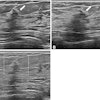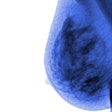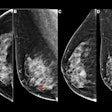
Offering breast cancer care in a war zone requires a particular creativity, especially when resources -- including basic imaging -- are limited. In a research letter published online October 2 in the Breast Journal, surgeons at a military hospital near Kabul, Afghanistan, described their experience providing Afghan women with breast cancer diagnosis and treatment.
The U.S. has made humanitarian healthcare available to Afghan civilians at Craig Joint Theater Hospital (CJTH) at Bagram Airfield since 2007, according to senior author, Dr. Daniel Choi, a major in the U.S. Air Force, and colleagues. Although the hospital's primary mission is to provide trauma care for U.S. and coalition forces, the facility has also treated Afghan nationals with nontraumatic diseases such as breast cancer, performing surgical resection, pathological analysis, adjuvant treatment, and follow up, contributing author Dr. Lucas Neff, now at Emory University in Atlanta, told AuntMinnie.com.
"We wanted to use our surgical skills to serve a population in extreme need," he said.
Late-stage, young women
Choi and colleagues operated on 12 women between January 2011 and September 2014. The women were referred to the facility via a civilian clinic run by the South Korean government, according to Neff. Preoperative workup, including mammography and biopsy, were not readily available, so patients were imaged with CT, mostly to assess for metastases (Breast J, October 2, 2016).
Of the 12 women, 83% presented with a palpable mass; all had breast surgery of some kind. Their median age was 40 and the majority were premenopausal. Seven patients were diagnosed with cancer, most of which was invasive ductal carcinoma measuring from 4.5 cm to 7 cm; four of these seven presented with palpable axillary lymph nodes. Of the seven cancers, four were estrogen-receptor positive, three were progesterone-receptor positive, three were HER2/neu positive, and one was triple negative.
When possible, the group sent pathology samples to Landstuhl Regional Medical Center in Landstuhl, Germany. The women were encouraged to return for postsurgical follow-up, and those with estrogen- or progesterone-receptor-positive invasive ductal carcinomas were encouraged to take tamoxifen, which they could purchase from pharmacies without a prescription.
Patients diagnosed with cancer were followed for a median of 241 days.
"The fact that our median follow-up was that long was fantastic under the circumstances," Neff said.
Culture clash?
The surgeons tried to be sensitive to Afghan culture by having female healthcare workers involved in the women's treatment when possible. But the patients were more matter-of-fact than expected, Neff said.
"Women came in covered head to toe in burkas, of course, but for the most part they didn't seem uncomfortable with dealing with male surgeons," he said.
The team was saddened to see that many of the women presenting with advanced breast disease were young, in their 20s or 30s. Even though Choi and colleagues offered the best care and treatment they could, they realized that the long-term quality-of-life outcome might not be favorable for these women.
"One of the women was 31, a teacher, not married, and no children," Neff said. "She had a mastectomy, and then we put her on adjuvant tamoxifen -- which would preclude pregnancy. Since there's a stigma associated with mastectomy and not having children, it was a double whammy for her; there are cultural constraints that might prevent her from having the life she wants."
Gathering the data for the research letter is a first step in understanding potential implications of wartime care, according to Neff.
"The U.S. military is good at codifying trauma protocol," he said. "But humanitarian care is a huge blind spot, since no one has collected this kind of information. And that's a shame, because if we can't understand what's been done, we may not be able to learn what we need to about healthcare in this setting."




















